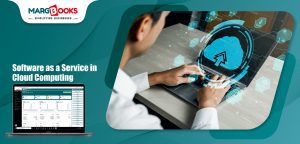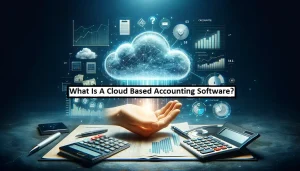What is Cloud Computing?
In essence, cloud computing is the practice of renting an internet computer rather than buying and maintaining one yourself. Cloud computing enables users to rent someone else’s virtual PC, on which files, programs, and tasks can be safely stored and accessed from any internet-enabled location worldwide, in place of purchasing and maintaining hardware themselves. Consequently, the difficulties and costs associated with buying and maintaining separate hardware systems are eliminated.
Companies that specialize in managing and safeguarding cloud computing services handle all technical matters for you, including hardware maintenance and software updates, so you can concentrate on using it for whatever your needs may be, such as storing photos, running apps, or collaborating.
Types of Cloud Computing
Using the internet to access and utilize computer services rather than handling actual machines yourself is known as cloud computing. Cloud computing comes in a variety of ways to suit different company requirements.
IaaS, or infrastructure as a service:
Renting IaaS online is similar to renting the fundamentals of a computer system online, such as virtual machines, networking power, or storage space! Because IaaS eliminates technical concerns, you can focus more on running the program itself rather than worrying about technical details related to IaaS usage and maintenance. It also gives you more freedom in terms of how much storage, networking capacity, or virtual machines you use based on what suits your needs!
Platform as a Service (PaaS): For software developers, a PaaS cloud service serves as a one-stop shop. PaaS eliminates the need for them to worry about complicated computer problems like hardware and software configuration, enabling them to create applications more quickly and with less technical difficulty. This makes it easy to create software projects and launch software in the cloud.
In cloud computing, Software as a Service (SaaS) is similar to renting software online rather than purchasing and installing it on your computer. Payments are used to use and maintain this online software, which is stored and managed by its provider. After that, access can be obtained from any device with an internet connection, and maintenance, upgrades, and technical support concerns are all resolved.
Benefits and Advantages of Cloud Computing
Cloud computing can be an extremely valuable asset to businesses. Here’s why:
- Saves Money: By only charging for what is used, cloud services allow businesses to save money by eliminating the need to buy and maintain expensive computer equipment.
- Simple Scalability: Companies may easily expand their computing needs by adding more ingredients when they need a higher yield, much like when baking a cake.
- Access Anytime, Anywhere: If you have internet access, you can view your files from anywhere, including on an airplane! * Operating On Any Device, Any Time of Day/Night • Cloud services take great care to safeguard the information they save, such as by installing an extra-strong lock to keep all of your private papers away from prying eyes!
- Maintaining Security: Cloud services go above and beyond to protect all of your documents.
- Simple Coordination: Cooperating Productively: This stage makes coordinaton easier; like having an office where everybody can share thoughts and team up successfully.
- Remain Protected in Brutal Times: When something terrible happens -, for example, PC issues or mishaps – cloud administrations carry on like legends who save your significant belongings from annihilation. They offer genuine serenity during troublesome times.
- Safeguards the Earth: Using cloud administrations can be perfect for the planet as they require less energy and assets for activity, in this way assisting take with better minding of our reality’s environment.
Distributed computing can act as a crucial partner in business tasks, simplifying everything and better generally speaking.




